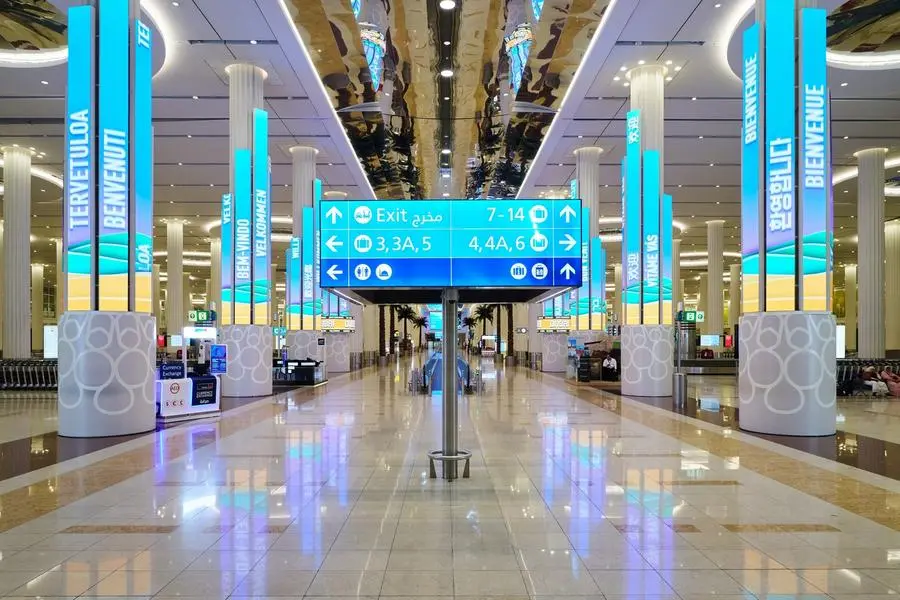PHOTO
Dubai, United Arab Emirates – Dubai International’s (DXB) work to cut carbon emissions has been recognised with a Level 4 “Transformation” accreditation from Airports Council International (ACI) Airport Carbon Accreditation (ACA) programme, placing it, as of September 2024, among the top 5% of participating airports worldwide to achieve this status.
The “Transformation” certification is awarded to airports that realise absolute emissions reductions and drive systemic change with its stakeholders. In strategic alignment with the UAE, Dubai Airports is playing a vital role in supporting the country’s Net Zero 2050 strategy— through its commitment to minimising its environmental impact and enhancing operational efficiency, with a comprehensive focus on decarbonisation, resource conservation, and the adoption of cutting-edge technologies.
Paul Griffiths, CEO of Dubai Airports commented: “Achieving Level 4 ‘Transformation’ accreditation underscores our firm commitment to embedding sustainability at the core of everything we do at Dubai Airports. This recognition not only highlights our progress in reducing our own carbon footprint but also reflects the strength of our partnerships in driving broader, systemic change across the aviation ecosystem.”
“For us, sustainability is not a checkbox – it’s a long-term strategy that involves collaboration, innovation, and constant improvement. The responsibility we own goes beyond our operation; it’s about leading by example and embracing a culture where every stakeholder plays a part in creating a more sustainable future. Together, we are setting a new standard for what is possible in airport operations, as we continue to support Dubai’s and the UAE’s leadership in the global effort towards Net Zero by 2050,” he added.
Stefano Baronci, Director General, ACI Asia-Pacific & Middle East, said: “We congratulate Dubai Airports for its significant strides in reducing carbon emissions, setting a benchmark for airports across the region. By positioning itself as one of the leaders in efficient carbon management, Dubai Airports demonstrates a strong commitment to building a more sustainable future. Dubai Airports’ approach aligns with our industry's collective vision of achieving net zero emissions by 2050.”
DXB has made significant progress through key initiatives and partnerships aimed at advancing sustainable aviation. A recent example is the collaboration with dnata and Emirates National Oil Company (ENOC), transitioning dnata’s non-electric airside fleet to a biodiesel blend, reducing carbon emissions by over 3,500 tonnes annually.
Other initiatives include a partnership with Etihad Energy Services to enhance energy efficiency through building and lighting retrofit and solar integration, and a collaboration with BEEAH Group, reducing landfill waste by 60% through an innovative food waste treatment plan. DXB’s adoption of the ‘Follow the Greens’ system has also optimised aircraft taxiing, cutting fuel consumption and emissions. Other successful initiatives include active engagement with ‘Airports of Tomorrow’, a collaborative venture by the World Economic Forum (WEF) and ACI, to steer the aviation industry toward net-zero carbon emissions by 2050.
The recently launched oneDXB Sustainability Alliance, a network of airport partners, is further driving sustainability by exploring over 180 additional potential decarbonisation projects.
The Level 4 ACI Accreditation affirms Dubai Airports’ leadership in sustainability and positions DXB as a benchmark in the global airport community.
For media enquiries, please contact:
Dubai Airports PR Team
pr@dubaiairports.ae
About Dubai Airports
- Dubai Airports operates both of Dubai’s airports, Dubai International (DXB) and Al Maktoum International (DWC).
- As an integrator, Dubai Airports works to balance the interests of all stakeholders to maintain aviation growth, protect operational resilience and ensure that service providers collaborate to provide a safe and secure service and improve customer experience whilst maintaining a sustainable business.
- DXB surpassed the 2019 levels of traffic in 2023 by welcoming 87m guests and forecast to reach 92m guests in 2024. The airport is expected to welcome 91.8, guests in 2024.
- DXB is ranked as the world’s number one airport by international passenger numbers for 2023, as announced by the Airports Council International (ACI).
- DWC embodies Dubai's vision for the future of aviation. With expansion plans announced in May 2024, involving a record investment of US$35b, DWC aims to reshape the aviation landscape.
- Over the next decade, DWC will accommodate 150m passengers annually, eventually expanding to 260m passengers and 12m tonnes of cargo.
- With five runways, futuristic design and seamless intermodal connectivity, DWC aims to revolutionise global air travel, setting new standards for efficiency and passenger experience for the next 50 years.
For recent updates, refer to our official social media platforms on Facebook, Instagram, LinkedIn, Twitter or hashtags: #DubaiAirports #DXB #DubaiWorldCentral
About Airport Carbon Accreditation
Airport Carbon Accreditation is the only institutionally-endorsed global carbon management certification programme for airports, which relies on internationally recognised methodologies. It offers a common framework for airports to manage and reduce carbon emissions with measurable goalposts, through 7 certification levels. Open to airports of all sizes, the programme enables the industry to reduce its carbon footprint, improve efficiency, and share expertise. The growing number of certified airports worldwide showcases the leadership of airports in lowering aviation’s carbon footprint. For more information visit: Home - Airport Carbon Accreditation




















